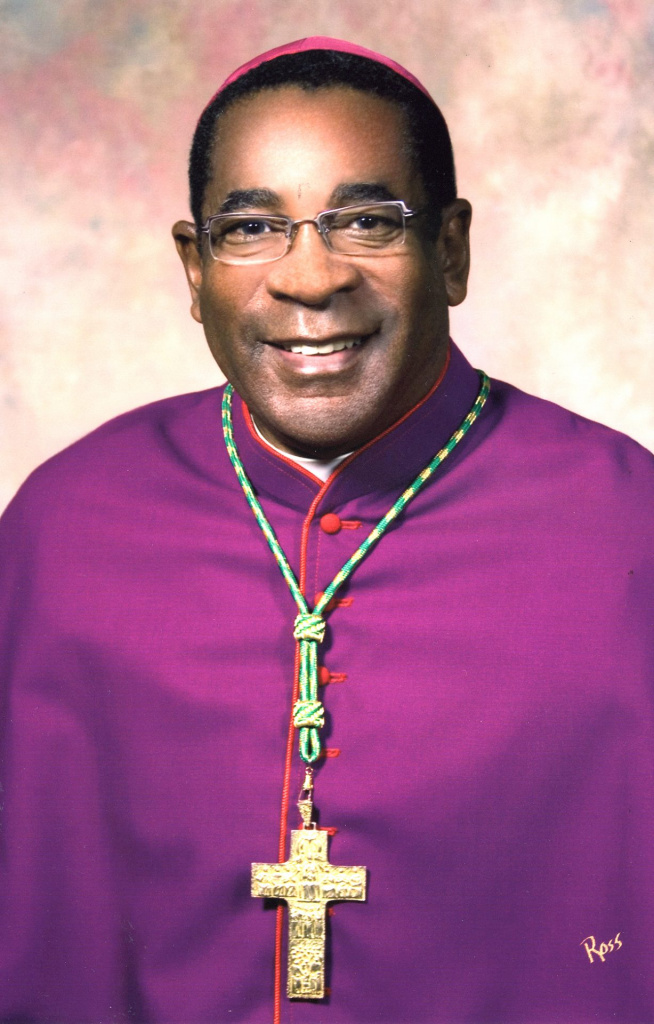 BISHOP J. TERRY STEIB
BISHOP J. TERRY STEIBThe oldest of five children, J. Terry Steib was born in Vacherie, Louisiana, to Rosemond and Vivian (née Jones) Steib. He worked alongside his father in the sugar cane fields of Louisiana. He attended St. Augustine Divine Word Seminary in Bay St. Louis, Mississippi from 1953 to 1957, and graduated from Divine Word Seminary in Conesus, New York, in 1961. He completed his philosophical studies also at Divine Word Seminary in Techny, Illinois in 1963, and earned a theological degree from Divine Word Seminary in Bay St. Louis in 1967.
Steib was ordained a priest of the Society of the Divine Word on January 6, 1967, and served as Assistant Dean of Students at Divine Word Seminary in Bay St. Louis until 1969. He was a professor at Saint Stanislaus College, a Catholic high school in Bay St. Louis, from 1967 to 1976, and earned a Master of Arts degree in Guidance and Counseling from Xavier University of Louisiana in 1973. In 1976, he was elected to the first of three terms (1976–83) as the provincial superior of the Society of the Divine Word’s Southern Province. He was also Vice-President of the Conference of Major Superiors of Men from 1979 to 1983.
On December 6, 1983, Steib was appointed Auxiliary Bishop of Roman Catholic Archdiocese of St. Louis and Titular Bishop of Fallaba by Pope John Paul II. He received his episcopal consecration on February 10, 1984, from Archbishop John L. May, with Bishops George Gottwald and Charles Koester serving as co-consecrators. He was named to succeed Daniel M. Buechlein as the fourth Bishop of Memphis on March 24, 1993, and installed on May 5, 1993.
During the 2008 presidential election, Steib declared: “We cannot be a one issue people … If our conscience is well formed, then we will make the right choices about candidates who may not support the Church’s position in every case.”
Pope Francis accepted his resignation – as is customary when a bishop turns 75 – August 23, 2016.
One of his most important accomplishments has been “the reclaiming of the Catholic schools to create one Catholic school system.” Known as the “Jubilee” schools, they include eight Memphis Catholic schools that were closed and have now been reopened. “When we closed a school in an urban area, we were leaving more than buildings behind; we were leaving behind children who yearned for a Catholic school more than ever,” says Bishop Steib, adding that “it is the heritage of Catholic education to lift up those most in need.”
He is a pioneer in a new ministry as well. In a pastoral letter from June of 2005, in This Far by Faith, Bishop Steib wrote: “To be sure that we do not leave anyone behind…to be sure that we promote genuine gratitude and reverence for the gift that each one of us is to the Church, we have begun to lay the foundations for a diocesan ministry with Catholic gay and lesbian persons.” Today, this remains an ongoing ministry, with monthly group meetings that have helped reconcile people with their families and the Church, fostering acceptance and love.
Reflecting on his experiences as an African American Bishop, he says, “An important challenge is to get our people in the Church to see the universality of church in all its cultural diversity, to look at and bless these differences and to see the beauty of one church and one family.” And being an SVD, Bishop Steib says, “means belonging to a community that values the cultural differences, accepts those differences and makes us missionaries of God’s Word.”
In discussing vocations for young African Americans, Bishop Steib feels that “for too long, we saw ourselves as servants of the people, without inviting them to join us.” In Memphis, he gathers pastors and interested young men at his residence for vocational discussions. “We share our stories and let them know that we were once like them, too. We try to open the door and help God along.”
Bishop Steib currently serves as a committee member for Hispanic Affairs, Evangelization and Conciliation and Arbitration. He is also Chairperson for Consecrated Life and serves as a member on the Board of Directors of the Catholic Extension Society. He stresses the importance of getting all clergy to work together, moving forward with the mission and vision of the diocese – educationally, socially and spiritually.
Looking ahead, Bishop Steib has set a new goal. “Based on depositions and legal cases, and after reading Matt Kelly’s book, Rediscovering Catholicism, I plan to research the question: Do people really know what Catholicism is all about?” He will write a series of pastoral letters, addressing Catholicism as a way of life, not just a fulfillment of obligations.
When asked about his motto, “The Lord is My Light,” Bishop Steib says, “I liken it to being a running back in football, inspired by Coach Vince Lombardi. You run to daylight – you find a way, a light, to get through the line. I keep my eye on the prize. The Lord is my Light – whom should I fear?”